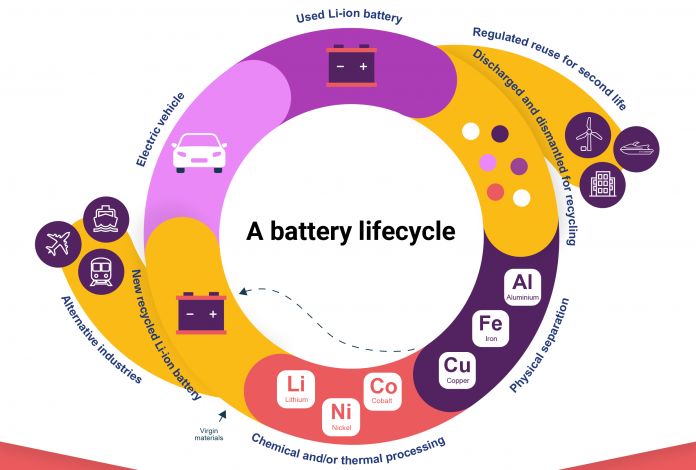The UK has everything it needs to become a frontrunner in the global battery recycling industry but, to achieve this, there must be collaboration across industry, academia and government, according to a new report.
The 2035 UK Battery Recycling Industry Vision, from the Innovate UK KTN Cross-Sector Battery Systems Innovation Network, identifies key areas for research and innovation, policy and regulation, infrastructure and skills. It emphasises the need for sustainable battery recycling processes, safe and rapid discharging of packs, and access to a trained, skilled and diverse workforce to secure the UK’s supply of battery materials including cobalt and lithium, two critical minerals with limited global supply.
Not only would an excellent battery recycling ecosystem boost the security of critical minerals in the UK, but it would also attract investment from battery manufacturers, who will be keen to open up shop near battery recycling centres where skills, knowledge and materials are close and in abundant supply, according to the report.
But to make this vision a reality, policymakers and innovators must act now to ensure the industry thrives in the future.
Co-author of the report, Sheena Hindocha, Knowledge Transfer Manager at Innovate UK KTN, says, “Without going into the politics of supply monopolies, there’s already a finite amount of raw material to make batteries, and with over 450,000 tonnes of cell production predicted for 2040, we must act now to develop the end-of-life infrastructure required for this demand.”
Co-author of the report, Nikoleta Piperidou, Knowledge Transfer Manager at Innovate UK KTN, adds “It’s well-known that EVs are going to play a key role in the UK’s race to net-zero by 2050. Collaboration is essential for success, from industry stakeholders and researchers, all the way to Government to develop the right strategy for the volume of EV batteries that are coming.”
The infographic and its supportive report also call for clear and safe industry practice to combat the high cost and risk that transporting batteries currently present, this can be addresses in several ways including through the integration of battery State of Health (SOH) to better identify and flag when a battery needs to be recycled, reused or repurposed.
To achieve this, robust infrastructure has been outlined as a crucial necessity to fully support the industry’s growth, without which could lead to the expensive and environmentally-damaging shipping of UK EV waste.
Access the 2035 UK Battery Recycling Industry Vision’s infographic and supportive report for the full details.




